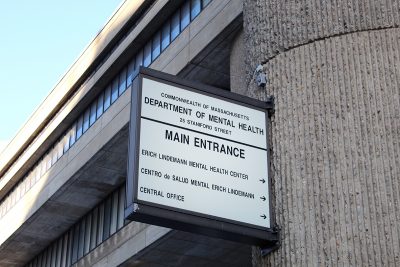
The Baker-Polito Administration announced Jan. 26 an allocation of $115 million to help facilitate easier access to behavioral health clinical services for adults and youth in Massachusetts.
The new resources include establishing a 24/7 Behavioral Health Helpline, launching a Behavioral Health Urgent Care program, creating new community behavioral health centers, permanently increasing Medicaid rates and expanding specific behavioral health-related programs.
These resources will support the “Roadmap for Behavioral Health Reform” — a multi-year blueprint introduced by the administration to increase access to mental healthcare — while reaffirming the state’s commitment to improving the behavioral health delivery system.
“I think the goal is to help people get easier access to the care they need when they need it and where they need it,” said Danna Mauch, president and CEO of Massachusetts Association for Mental Health.
Mauch said those experiencing mental health crises need to be able to access services quickly to receive care.
“Right now, too many people wait a long time to get access, for example, to an outpatient therapy visit,” Mauch said. “Sometimes while they’re waiting for us, a visit that is scheduled months out to occur, their situation deteriorates and they end up in a crisis.”
Mauch said if a patient’s mental state becomes life-threatening, their only option to get admitted for care at the moment would be to visit the emergency room to be screened.
Benjamin Paul Ocasio, the director of Development and Clinical Operations in Community Caring Clinic for both Boston and Springfield, said the initiative is “critical” for underserved people who are turning to forms of substance abuse to deal with emotional pain and isolation from the pandemic.
“We serve a lot of refugees and underserved population minorities that have a lot of economic problems so they sometimes don’t have the services that others have,” Ocasio said. “There’s a major need for more clinicians dealing with mental health needs of the underserved and the entire population.”
He added that there was a struggle to find more people to work while also balancing a tight budget.
“We’re having a very difficult time reaching or hiring people because [there’s] such a need for psychologists and clinicians,” Ocasio said. “I think [that the] more funds that are made available, we can hire the people and be able to serve the people that need mental health services.”
Susan Wilkinson, a psychiatric nurse practitioner and founder and CEO of Ally Integrated HealthCare, said a bigger collective effort should be made to improve access to private practices and self-employed doctors as they are an “underutilized resource.”
“I would encourage any policymakers or the people in power to really reach out and try to work with private practices because we don’t get funding from the state,” Wilkinson said. “We don’t get funding from the federal government, so our cost of delivering care is way higher than most of the other community health organizations that get funding from the federal government or the state.”
The Boston Intercollegiate Government released a statement Jan. 31 calling for attention to the mental health crisis among college students.
“We echo the Baker-Polito Administration’s urging for colleges and universities to offer greater support to college-aged students, but again reiterate our call for policy-makers to engage directly with the college-aged student community struggling with the dual pandemics of COVID-19 and mental health challenges,” BIG wrote in its statement.
In response, Mauch said the Secretary of Health and Human Services has recognized the need for improved mental health at college, while adding that people should be aware of the resources available to them.
“The most important thing is that people become aware of this, not only trying to protect their own mental health and well-being but learn more about how services are organized and delivered so they can get access in a timely way to what they need,” said Mauch.

















































































































